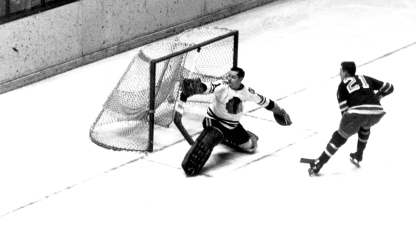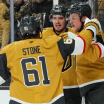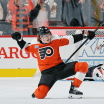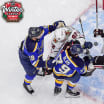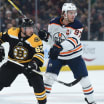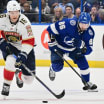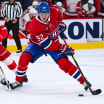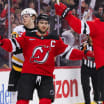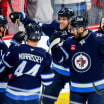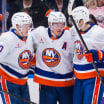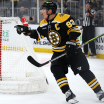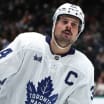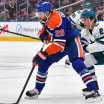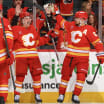Legendary hockey reporter Stan Fischler writes a weekly scrapbook for NHL.com. Fischler, known as "The Hockey Maven," shares his humor and insight with readers each Wednesday.
This week is a conversation with Camille Henry during his second NHL season, also taken from "The Game I'll Never Forget: 100 Hockey Stars' Stories" written by Chris McDonell. It's the story of a French-Canadian forward who during his youth was told endlessly he'd never make it to the NHL because he was too light and thin to survive yet fooled the skeptics and had the trophies to prove it.
In Quebec City, a young Camille Henry often was reminded that he should forget about a professional hockey career.
"From my very first team," the crafty forward said while with the New York Rangers in 1954-55, "right up to the pros the word was that I was too skinny to deal with NHL body checks and other rough stuff."
Despite the pessimistic barbs, Henry (5-foot-9, 152 pounds) had two assets, a keen hockey mind and superior skill level that would enable him to surmount the obstacles. He retired in 1969-70 a winner of the 1954 Calder Trophy and the 1958 Lady Byng Trophy over 14 seasons with the Rangers, Chicago Black Hawks and St. Louis Blues.
Henry died at the age of 64 on Sept. 11, 1997.
Were you a Canadiens fan?
"I wanted to be like Montreal's great Maurice Richard, 'The Rocket,' but every coach said that I was too small, too skinny. That's how I got the nickname 'Camille the Eel,' but whether I played bantam, midget or juvenile hockey, I led the leagues in scoring. Still, my coaches kept saying, 'Forget about the NHL, you'll get hurt.'"
Who gave you the break you needed?
"My Quebec Citadelles junior coach, Phil Watson, who'd been on the Rangers' 1940 Cup team. When I was 17, Phil took me on and within two seasons I was among his leading scorers. Phil was a great hockey coach, maybe the best I ever had in my whole career. Thanks to Watson, my game improved to the point where I got noticed, especially by Frank Boucher, who was (general) manager of the Rangers. He eventually gave me an NHL contract."
When did you know you'd made it in the NHL to stay?
"I beat out the favorite for NHL rookie of the year, Jean Beliveau, and won the 1953-54 Calder Trophy."
Which game was your best?
"Late in my rookie year we played the Red Wings in Detroit (March 13, 1954). We were up against 'The Production Line' with Ted Lindsay and Gordie Howe, plus a tough defense and the great Terry Sawchuk in goal. Well, I beat Sawchuk in the first period on a power play and got another power-play goal in the second, giving us a 3-2 lead."
What were you thinking at the time?
"Two goals seemed plenty for me against a club like Detroit, but we got a break in the middle of the third period when Howe got nailed for high sticking. With Max Bentley as my quarterback on the power play, 'Maxie' set me up for my hat trick goal, but that wasn't all. In those days a team could score more than one goal on a power play. Sure enough, Maxie fed me again, I scored my fourth goal and we won 5-2."
What were the consequences?
"I not only won the Calder, but my four goals hurt Sawchuk's Vezina Trophy chances and Harry Lumley of Toronto beat Terry for that prize. Sawchuk was so mad that when we met a week later, he bawled me out: 'You cost me plenty!' What he meant was that he was out a couple of grand because he also wasn't going to make the First All-Star team -- also because of my big night."
What was your power-play secret?
"All the credit goes to Max Bentley. He was the biggest help I ever had because he talked hockey with me nonstop. If I wanted to stay up all night talking about how to work the power play, Max would stay up with me. When we went on long train rides, he used to have to kick me out of his compartment at five in the morning. He'd talk hockey and I'd sop it up like a sponge."
What was special about Bentley?
"Max's skating and stickhandling. Another time in Detroit he told me he was going to score a goal on his next shift. I told him that if he was going to score one, I was going to score, too. In the second period we had a power play and Max stickhandled the puck down the ice through Howe, Lindsay, (Bob) Goldham and (Red) Kelly. Then, he put a move on Sawchuk and scored. That done, he skated over to our bench and winked at me and said, 'Don't worry, you'll score.'"
Did you score?
"A minute later Max got the puck and went through their defense again. When he got in on Sawchuk, he deked him cold turkey and sent the puck over to me on the left side, so I easily put the puck in the net."
Weighing only 150 pounds, you must have had trouble surviving.
"It wasn't easy because there were plenty of big guys who checked hard. I may have been nicknamed the Eel, but that didn't mean that I could get away from all the hitters. I had to keep my eyes peeled for dangerous players and give them the slip before they whacked me."
Who gets credit for your long career?
"Frank Boucher. When the 1953-54 season started he said, 'I'll take you with us but won't dress you for a while and then give you a spot here and there.' After the first game, he decided to play me, and I scored a goal and then 278 more goals after that. When others didn't, Boucher had faith in me and gave this skinny kid a chance to show his stuff.
"If it wasn't for 'Boosh,' I don't know if I ever would have made it."
